Overcoming Passive-Aggressive Behavior
In our previous article, we talked about the meaning and signs of passive-aggressive behavior, and how to deal with passive-aggressive people. Here, we will share how to recognize this behavior, which can lead to overcoming passive-aggressive behavior in ourselves.
Recognizing Passive-Aggressive Behavior in Yourself
The easiest way to go about recognizing passive-aggressive behavior in yourself is to understand what it looks like. Passive aggression is commonly expressed as:
- Heavy use of sarcasm
- Backhanded compliments
- Giving people the silent treatment
- Consistent procrastination on projects or work
- Agreeing to something and breaking your promise
These are just some examples of passive-aggressive behavior. For an in-depth overview of passive-aggressive behavior, take a look at Psychology Today’s breakdown of passive aggression or review our previous article here.
When you understand how passive-aggressive behavior is commonly expressed, you can begin to notice when you may act this way. When you do exhibit some form of passive aggression, you can take a step back and notice what you just did or were about to do. This first step of awareness is the beginning of positive change, which is beneficial in the path to overcoming passive-aggressive behavior.
If you are recognizing passive-aggressive behavior within, give yourself a pat on the back for self-awareness. Becoming aware of the behavior is the first step to changing it for the better. So, how can you tackle your own passive-aggressive behavior?
How to Overcome Your Own Passive-Aggressive Behavior
According to Ladan Hayes, there are six steps to overcoming passive-aggressive behavior.
Become aware of the behavior.
Once you are aware that you are being passive-aggressive, it will be much easier to stop and reflect on healthy ways to express your feelings.
`Understand why you should change your behavior.
If you don’t know why passive aggression is harmful, you won’t see any need to change your behavior. Passive aggression is essentially an indirect form of aggression that is not any better than direct aggression itself. If left unaddressed, passive aggression can damage your relationships.
Be patient with yourself.
You likely won’t overcome your passive-aggressive behavior in one day. Changing your behavior means developing new, healthier patterns and habits for expressing your feelings and concerns.
Understand that it is OKAY to be angry.
Don’t shame or condemn yourself for feeling angry. Instead, understand that it is okay to feel this way. Feeling negative emotions doesn’t make you a bad person. In fact, recognizing these emotions and being willing to work with them is one of the most positive things you can do for yourself and your relationships.
Learn to be assertive rather than aggressive.
Instead of getting sarcastic with someone because of something they said or did, learn to be assertive in expressing your thoughts and feelings about the situation. That way, the other person doesn’t have to guess what you want to see changed.
Be open to feedback.
This is important. As you learn to be assertive, you are learning to communicate with people in a way where they can value and understand what you’re feeling. But for them to be open to understanding you, you need to be open to understanding their perspective, as well. When you assert your concerns directly, remain open to feedback so you and the other person can come to a mutually beneficial understanding of how to move forward in the future.
Additionally, seeking therapy is an excellent way to assist in overcoming passive-aggressive behavior. By taking time to speak to a therapist, you can work to address the core emotions causing your passive aggression and learn healthy ways to manage your emotions and express your thoughts and feelings.
Contact Creative Counseling Center
Do you think you might be passive-aggressive? Do you currently recognize passive-aggressive behavior in yourself and wish to speak to a therapist?
Schedule a free phone consultation to learn more about our services. We have a team of experienced counselors in the Denver area, and we would love to provide support to your family. We look forward to hearing from you.
Contact Us
We will get back to you as soon as possible.
Please try again later.

ABOUT THE AUTHOR
Teri Karjala is a Licensed Professional Counselor & Marriage and Family Therapist. She is the founder and Executive Director of Creative Counseling Center, LLC. Working in the field since 1999, Teri and her team of therapists specializes in counseling for those who have experienced trauma. They work with children as young as age 2, as well as teens and adolescents, adults, seniors, families, and couples.
REQUEST A FREE CONSULTATION
If you have questions about counseling, would like to find out if counseling could help you or a loved one, or are interested in learning more about our services, just complete the brief form below to request a Free Phone Consultation. A member of our team will contact you shortly. After a brief conversation, we'll determine together whether our practice is right for you and which therapist may be best suited for your specific circumstance.
Finding the right therapist, one you click with, is less about the therapist's experience and qualifications and more about the therapist's personality. So let's talk. Let us match you with a therapist you have a high likelihood of clicking with.
Fields marked with an * are required.
Contact Us
We will get back to you as soon as possible.
Please try again later.
GET SOCIAL WITH US
CONNECT WITH US
PHONE
EMAIL US
ADDRESS
6021 South Syracuse Way, Suite #216
Greenwood Village, CO 80111
OFFICE HOURS
Monday-Thursday: 8:30am-8pm
Friday: 12pm-5pm
Saturday: 12pm-4pm



